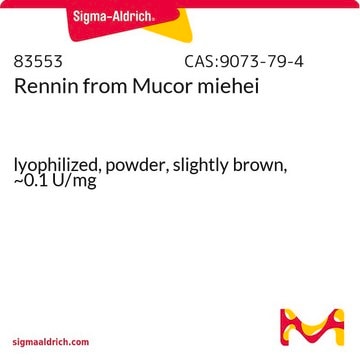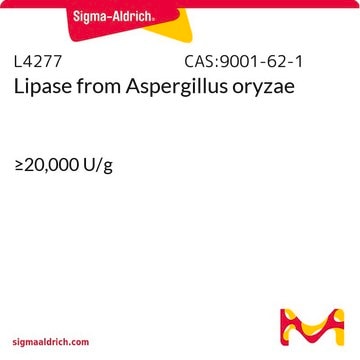R5876
Rennet from Mucor miehei
Type II
Synonym(s):
Chymosin (primary component)
Sign Into View Organizational & Contract Pricing
All Photos(3)
About This Item
Recommended Products
biological source
microbial (Rhizomucor miehei)
Quality Level
type
Type II
form
powder
concentration
≥4% protein (Lowry)
storage temp.
−20°C
General description
Rennet, an enzyme extract is mainly used in the dairy industry. Chymosin is the main constituent of rennet. In commercial preparation of rennet, other proteases like bovine pepsin is also present in varying concentrations.
Application
Rennet from Mucor miehei has been used:
- for milk coagulation trials
- to coagulate the untreated milk and patatin treated milk
- to coagulate the defatted samples of mammary secretions
Studies have shown that heat treatment of milk causes an increase in the rennet-induced coagulation times. This time was proportional to the temperature of the heat treatment.
Physical form
Powder containing maltodextrin and sodium chloride
Storage Class Code
11 - Combustible Solids
WGK
WGK 3
Flash Point(F)
Not applicable
Flash Point(C)
Not applicable
Personal Protective Equipment
dust mask type N95 (US), Eyeshields, Gloves
Certificates of Analysis (COA)
Search for Certificates of Analysis (COA) by entering the products Lot/Batch Number. Lot and Batch Numbers can be found on a product’s label following the words ‘Lot’ or ‘Batch’.
Already Own This Product?
Find documentation for the products that you have recently purchased in the Document Library.
Robin Dorau et al.
Applied and environmental microbiology, 87(21), e0103521-e0103521 (2021-08-19)
Lactococcus lactis subsp. lactis (referred to here as L. lactis) is a model lactic acid bacterium and one of the main constituents of the mesophilic cheese starter used for producing soft or semihard cheeses. Most dairy L. lactis strains grow
Potato patatin generates short-chain fatty acids from milk fat that contribute to flavour development in cheese ripening
Spelbrink REJ, et al.
Applied Biochemistry and Biotechnology, 176(1), 231-243 (2015)
Impact of Physical-Chemical Properties on Milk Coagulation Ability for Some Albanian Breeds of Cow, Sheep and Goat
Hoxha M and Mara V
International journal of language & communication disorders, 1(3), 234-238 (2012)
Microbial production of enzymes used in food applications
Micro Electro Mechanical Systems (MEMS), 2011 IEEE 24th International Conference on. IEEE, 262-287 (2013)
Factors affecting enzyme activity in food processing
Proteins: Structure, Function, and Genetics, 337-365 (2018)
Our team of scientists has experience in all areas of research including Life Science, Material Science, Chemical Synthesis, Chromatography, Analytical and many others.
Contact Technical Service








